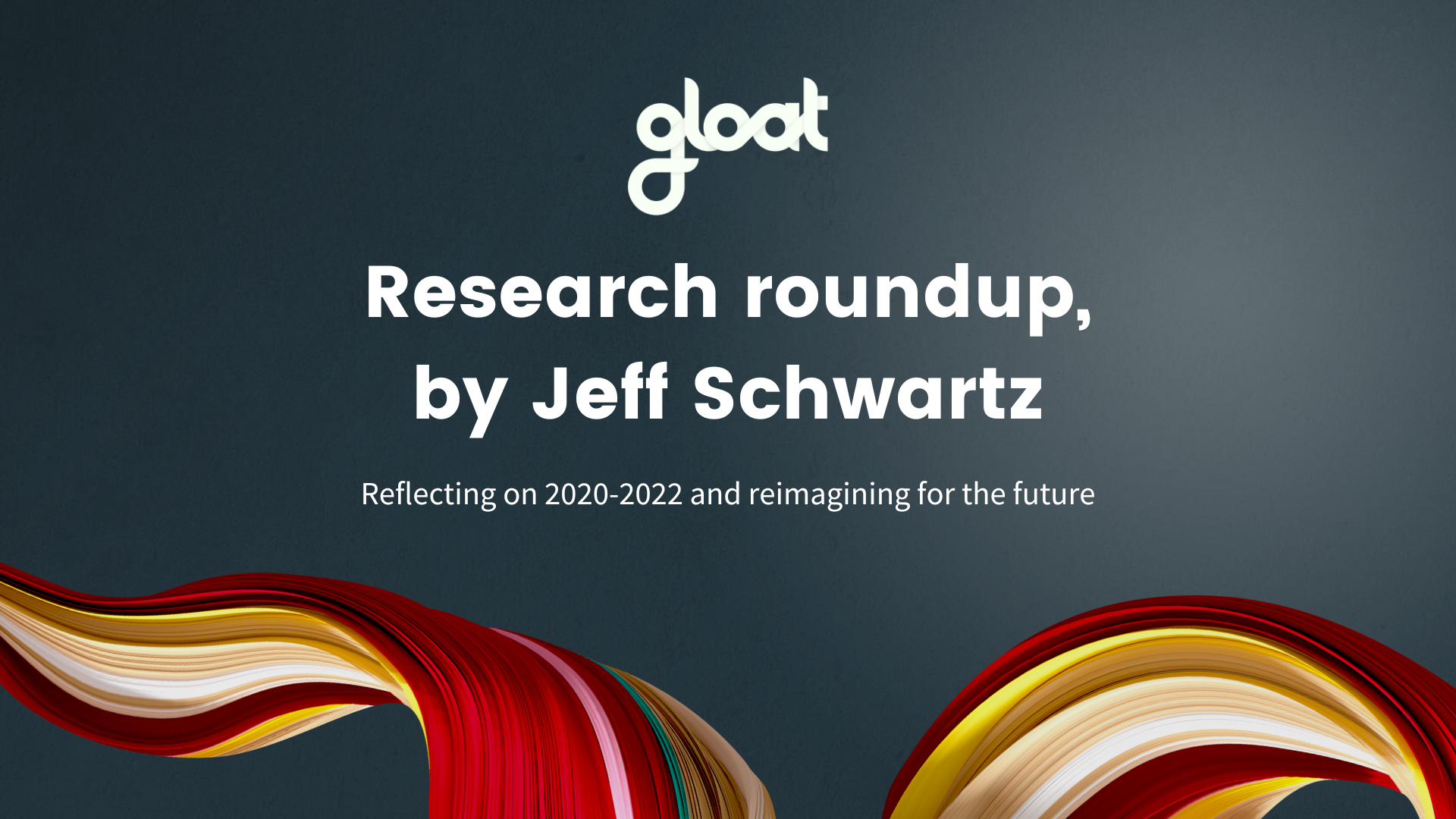September research roundup
What I am reading, listening to, and thinking about in the world of talent marketplaces and workforce intelligence

Now that we’re in the last quarter of 2022, leaders have their eyes towards the future. As Lynda Gratton said in an episode of the Hack the Future podcast with Terence Mauri, “We’re in a moment of liminality. We’re between worlds, with one foot in the pre -Covid era and one in the future.” Executives in every region and industry are looking to reassess their operating models, pinpoint their greatest challenges, and devise transformative strategies that will steer their organizations towards success in 2023 and beyond.
I felt a shared sense of urgency last month, as I met with business and HR leaders, first in Europe and more recently at the 2022 HR Technology Conference in Las Vegas. During a conversation with Josh Bersin, we not only discussed the powerful role that talent marketplaces play in accelerating transformation initiatives but also the concerns leaders face right before launching these platforms.
As he explained, “These companies went into this journey with Gloat a little nervous and not sure what was going to happen. And it exploded with things they never dreamed would happen before because they trusted their employees to do the right things. They trusted their managers to do the right things.”
There are a few takeaways from our chat that I think will resonate with most leaders, regardless of where they are in their reimagination journeys. First, skills, flexibility, and growth will be at the heart of every successful transformation, and second, the most impactful strategies will be rooted in cultivating purpose and a shared sense of trust.
If leaders can align on transformation efforts that are both skills-based and purpose-led, they’re on the right track to unlocking agility and maximizing business success. That’s why this month’s research roundup is dedicated to spotlighting articles, podcasts, and reports that put meaningful skills strategies front and center, so leaders can make 2023 their year to achieve game-changing results with our eyes on the future.
Here are the pieces I am reading, listening to, and thinking about to prepare for the year ahead:
READ What’s new in thought leadership about the future of work
Your Office Needs a Purpose, McKinsey, by Phil Kirschner, Adrian Kwok, Matt Schrimper, Brooke Weddle
As pandemic restrictions subside, many people are rushing back to in-person experiences, often with one noteworthy exception: the office. McKinsey suggests that many return-to-work plans are missing the mark because leaders are overlooking the importance of purpose. If employees don’t feel like going into the office is worth the commuting effort, in-person work will continue to fall flat. McKinsey’s team offers several examples of purpose-led return to office initiatives, including an innovation hub that an investment firm created to support life sciences innovation.
This is what’s really behind ‘quiet quitting’ (and what leaders can do about it), FastCompany, by Ben Reuveni
There’s a new term stoking fear amongst business and HR leaders: quiet quitting. Rather than officially resigning, some disengaged employees are choosing to coast and settling for the bare minimum. Rather than letting morale dwindle, Gloat’s CEO Ben Reuveni penned a piece explaining what leaders can do to put a stop to quiet quitting once and for all. His recommendations include prioritizing learning and development and tapping into mentoring to ensure all employees are pursuing meaningful career paths that inspire them to keep giving their all.
Worker shortages are fueling America’s biggest labor crises, The Washington Post, by Abha Bhattarai
While a lot has changed since talks of a “Great Resignation” first began, employers are still struggling to retain and engage their workforces in a tight labor market. Reporter Abha Bhattarai explores how workers in education, healthcare, and the railroad industry are pushing back after months of staffing shortfalls, underscoring the need for widespread reimagination efforts.
How to Get Started with Skills-Based Talent Strategy, my HR Future, by Manpreet Randhawa
Many leaders are setting their sights on skills-based strategies as a key way to get ahead in the new world of work. Yet, there’s still plenty of uncertainty about what it takes to shift work operating models from focusing on jobs to prioritizing skills. Manpreet Randhawa breaks down the core components of a skills-based strategy and explains why so many businesses are turning to talent marketplaces to bring it to life.
Identifying, Growing, and Recruiting Talent, The Future Does Not Fit into Containers of the Past, by Rishad Tobaccowala
Author and provocateur Rishad Tobaccowala presents an interesting new framework for assessing talent. Referred to as the 6 Cs, he notes that the following six skills will be essential in the future: Cognition, Creativity, Curiosity, Collaborate, Communicate, and Convince. The first half of the three Cs describes individual competencies, while the latter explores how we connect with each other and the world outside of our minds. Tobaccowala goes on to explain that many companies mistakenly hire or tolerate unbalanced people who excel in individual skills but are terrible at collaborating and communicating. Instead, leaders should search for talent that possesses at least two skills in each area, ensuring employees are both autonomous and collaborative.
LISTEN What I’ve been playing on repeat
Talent Hiding in Plan SIght, The So What Podcast, with Nithya Vaduganathan
At many organizations, talent shortages are exacerbated by a lack of internal opportunities, as Boston Consulting Group explains in a recent episode of their The So What podcast. Only 10% of jobs are filled by internal candidates, suggesting that many companies need better ways to find qualified employees from across their organization. Gloat’s Director of Strategic Initiatives, Brian Hershey, joins Nithya Vaduganathan to discuss how talent marketplaces are revolutionizing internal mobility.
Lynda Gratton, Hack the Future, with Terence Mauri and Lynda Gratton
A great podcast from two of my favorite thought leaders, Lynda Gratton and Terence Mauri. This episode is all about leading from the future and taking advantage of the liminality of the moment we’re in, with one foot in the pre-COVID world and one foot in the future. Thanks to both for the shoutout about my recent book, WORK DISRUPTED, and my work with Gloat, the pioneer and leader in talent marketplaces and workforce intelligence.
Credly’s Jonathan Finkelstein on the evolving language of skills, HBS Managing the Future of Work, with Jonathan Finkelstein
If you’re a leader who’s interested in taking a more skills-based approach to talent management, think of this podcast episode as required listening. Credly’s founder and CEO Jonathan Finklestein explores how a detailed skills taxonomy can benefit both workers and employers, in turn setting businesses up for success in the new world of work.
SAP’s Sabine Bendiek on workforce strategy, Managing the Future of Work, Harvard Business School
As businesses struggle to overcome supply chain disruptions and navigate hybrid working, devising an agile workforce strategy has become a prerequisite for success. Yet, when it comes to carving a path forward, many leaders are unsure about where to start. SAP’s Chief People and Operating Officer and Labor Relations Director, Sabine Bendiek, joins Harvard Business School’s Managing the Future of Work podcast to discuss best practices for talent acquisition, diversity and inclusion, ESG goals, and training the next wave of leadership.
THINK What research and studies are saying about our path forward
The Great Resignation 2.0: 12 statistics show that employees haven’t moved on, Gloat Research
The latest findings from the Gloat Research Group are out, including this follow-up to last year’s Great Resignation Research Report. After polling 1,300 employees and HR leaders about their workplace sentiments, it’s clear that the Great Reassessment is continuing well into 2022 and beyond. While our findings indicate that burnout and disengagement remain high, the latest survey also reveals that HR leaders are beginning to take action, with nearly three in four reporting that new systems of agile work are being studied or implemented as we speak. Keep an eye out for the full reports, which will be published later this month.
12 workforce agility statistics: what workers want, what HR can deliver, Gloat Research
Our new research also sheds light on the pressing challenges that leaders are facing as they strive to unlock agility and embrace more dynamic ways of working. We commissioned a survey of more than 1,300 employees and HR managers to get their perspectives on jobs, skills, and the future of work. This survey weaves together multiple vantage points, including what HR managers are prioritizing and how employee expectations are evolving, so that leaders can steer their organizations towards a high-impact agile transformation strategy.
10 workforce skills statistics every HR leader needs to know, Gloat Research
Last but certainly not least, the Gloat Research Group will be publishing a new workforce skills report, based on the findings from our latest survey of 1,300 HR managers and employees. The survey explores how shifting to a skills-based strategy will revolutionize the way we work, as well as spotlighting the challenges that both employees and leaders face as they strive to put skills at the center of every initiative.
The skills-based organization: A new operating model for work and the workforce, Deloitte, by Sue Cantrell, Robin Jones, and Michael Griffiths
The days of people being defined by their jobs are coming to a close, based on Deloitte’s predictions. Their piece on the rise of the skills-based organization discusses how businesses are moving away from confining work to standardized tasks and instead increasingly prioritizing skills-based strategies to unlock greater agility and maximize employee potential. The article sheds light on some of the trailblazing organizations that are already embracing skills-based strategies and the technologies they’re harnessing, including Unilever and the success of their talent marketplace.
CONNECT What future-fit organizations and leaders are talking about
Beyond the Great Resignation to the Great Reassessment—Fundamental Shifts and Challenges, Jeff Schwartz, Linkedin
It has been over a year since business and HR leaders started talking about the Great Resignation. Yet, some executives are still overlooking the key takeaways that sit at the heart of the Big Quit. In my latest Linkedin piece, I discuss the lessons leaders can learn from the Great Resignation and the steps employers should take now to meet their people where they’re at, based on the newest research from Gloat.
Flipkart, Linkedin
In addition to discussing talent management strategies for the new world of work, it’s important to spotlight organizations who are putting best practices into action—including our friends at Flipkart. The leading e-commerce company recently created a week-long roadshow to showcase the breadth of career development opportunities that employees can tap into by utilizing the organization’s talent marketplace.
Surendra Rosha, Linkedin
Similarly, Surendra Rosha, Co-Chief Executive, Asia Pacific at HSBC, details how his organization is embracing a skills-based approach powered by the company’s talent marketplace. He explains that their skills-matching platform enables colleagues to work on short-term projects, network, and deepen their expertise. The platform will also enrich HSBC’s data insights and understanding of the skills and development priorities across the bank, ensuring leaders have the insights they need to prepare for the future of work.
Stephan Meier, Linkedin
Columbia Business School Professor Stephan Meier points out a stark imbalance that is largely going unnoticed: executives are putting a much heavier focus on customers than they are on employees. He notes that text analysis of earnings call transcripts of S&P firms reveals that executives talk about customers ten times more often than employees. Additionally, executives perceive customers to be analogous to opportunities and employees to risks. These findings indicate that, for many leaders, it may be time to reevaluate how employees are viewed and how much effort they put into keeping them satisfied.
Let us know what you would add to our list.





